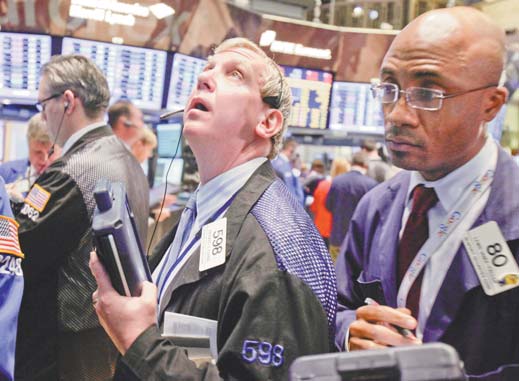Dow loses almost 250 points on debt woes

Traders Richard Cohen, left, and Lewis Vande-Pallen, work on the floor of the New York Stock Exchange on Monday. The Dow Jones industrial average took a fall of nearly 250 points Monday in reaction to the failure of a congressional supercommittee to agree on a plan to cut the U.S. government’s budget deficit.
Associated Press
NEW YORK
The stock market was not exactly surprised that a so-called supercommittee in Congress failed to reach a deal to cut the federal budget deficit. But since summer, investors have sold at the first hint of trouble.
So on Monday, they sold big. The Dow Jones industrial average lost almost 250 points on a day when investors despaired over debt problems at home and abroad.
Members of the special committee, created in August to come up with $1.2 trillion in deficit cuts over 10 years, indicated all day that there would be no deal. After the market closed, the committee’s bipartisan leadership made it official.
“They’re essentially giving up,” said Robert Robis, head of fixed-income macro strategies at ING Investment Management.
The supercommittee stalemate is supposed to trigger automatic spending cuts across the government, but already there were hints that Congress would find a way around them. Analysts say that could lead to another downgrade of the U.S. credit rating.
In addition, the failure raises the question of how a gridlocked Congress will find a way to renew a cut in the Social Security tax or agree on whether to extend long-term unemployment benefits.
Congress passed the tax cut last December for one year, and some lawmakers support extending it through 2012 because economic growth remains weak. Both measures would put cash in the pockets of Americans, who can spend it and help the economy grow.
The stalemate also shows lawmakers may not be able to make progress on anything budget-related in the coming months, said Robert Pavlik, chief market strategist with Banyan Partners LLC in New York.
The result was another day of heavy selling in a market that has grown used to big swings. The Dow finished down 248.85 points, or 2.1 percent, at 11,547.31. At its low point of the day, the Dow was down 342.
Volatility seized the stock market in late July, when Congress was wrestling with whether to raise the limit on how much the federal government can borrow.
The Dow rose or fell 100 points or more on 15 trading days in August, 16 in September and 15 in October. Monday was its 10th triple-digit move this month, with six trading days to go.
“People are getting so short-term oriented now that all they know is how to make day trades,” he said.
The selling swung the Dow from a gain for the year to a loss, the first time that has happened in a month.
In Europe, Moody’s, a prominent ratings agency, warned that France could face a downgrade because the debt crisis in Europe has pushed borrowing costs higher for the French government. For now, France has a rating of AAA, the best.
One European country after another has fallen into crisis because of debt. Wary of the ability of countries to pay back their loans, bond investors have insisted on higher returns on national bonds, pushing borrowing costs to dangerous levels.
Stock indexes fell 3.4 percent in both Germany and France — bigger declines than in the United States. Germany and France are the two largest economies in Europe.
Investors still see American debt as safe, despite the failure of the supercommittee. On Monday, the yield on the benchmark 10-year Treasury note fell to 1.97 percent. It traded at 2.01 percent late Friday.
Bond yields move down when bond prices go up. The higher demand for U.S. bonds Monday was a sign that investors believe in their safety.
The Standard & Poor’s 500 index dropped 22.67, or 1.9 percent, to 1,192.98. The S&P 500 fell 3.8 percent last week, its worst since September. The Nasdaq composite index declined 49.36, or 1.9 percent, to 2,523.14.
 43
43
